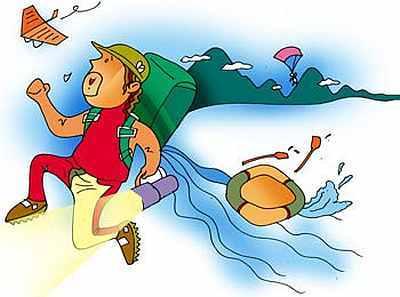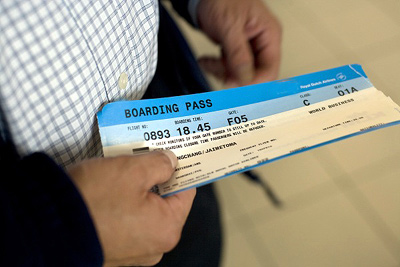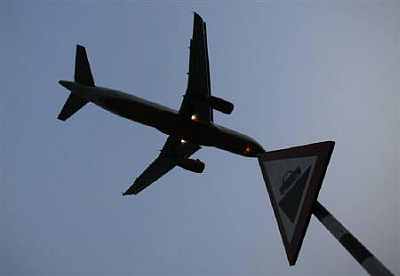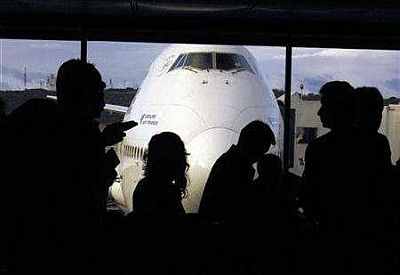 | « Back to article | Print this article |
Are online travel companies gouging customers?
Recently, online travel portals -- such as Nasdaq-listed MakeMyTrip.com and Yatra.com -- have been able to pull off an exceptional feat in India, one that has brought them more notoriety than adulation.
They have, in a very short span of time, enraged both online customers who come to their site to shop for airline tickets as well as India's leading airlines such as Indigo and Jet Airways who are their valuable clients.
These sites, amongst others in the online travel space, have been accused of different things by both these groups -- but the accusations amount to pretty much the same thing: Unsavoury selling tactics.
Click NEXT to read more...
Are online travel companies gouging customers?
Yet, as the dust begins to settle on these disputes, the crucial question for an industry that is still growing, albeit rapidly, remains unanswered: Are travel portals indeed gouging customers or are they in fact simply adopting practices that their brethren in more advanced online markets in the West have long considered to be business-as-usual?
Incidents that have incurred the wrath of online customers seem indefensible. Take the case of Parth Das (name changed), a sales executive in a multinational company, who logged on to leading online travel agent (OTA), MakeMyTrip.com, about two weeks ago to book a flight ticket for his mother's Kolkata trip.
Das was amazed to see that between the time he selected a flight and made the final booking, the fare had jumped by more than Rs 2,000.
Click NEXT to read more...
Are online travel companies gouging customers?
When he checked with colleagues and friends, he was told the same was happening on other travel sites as well including Yatra.com. Indeed, identical complaints about stratospheric price jumps taking place in a matter of seconds have been logged in the thousands.
The explanation given by travel portals for the change in fare: Prices have gone up due to unavailability of seats and this was the best fare on the route. This was then re-formulated as a 'technical problem' that consumers say lasted for at least two whole days.
"It can happen in the cusp period, when airlines are changing fares and it takes time to reflect on the portal. We try to minimise such instances," Keyur Joshi, co-founder and COO, MakeMyTrip.com said.
Click NEXT to read more...
Are online travel companies gouging customers?
While online ticket-shoppers started to become increasingly incensed at this development, the online travel portals managed to infuriate yet another important stakeholder in their business -- airlines.
Companies like MakeMyTrip.com were now being accused of selling 'opaque' fares --heavily discounted tickets that were made available to customers while the name of the airline was withheld.
Insiders pointed out that most airlines were upset over OTAs selling troubled airline Kingfisher's tickets at throwaway prices. The furore was enough to force the Directorate General of Civil Aviation (DGCA) to step in and sort things out. Ultimately, OTAs were made to stop the practice.
Click NEXT to read more...
Are online travel companies gouging customers?
Question is, did OTAs in fact do anything unethical compared to their international peers? Were these fares in fact opaque -- or if they were, should the industry in India regard it as anathema?
Industry observers say opaque fares are in fact a popular international concept, where one can access cheap tickets by booking them without knowing the airline you would fly, till the payment is made.
"Internationally, airlines -- and portals -- offer opaque fares because they really need to increase sales and do not want to dilute their brand equity by being labelled a cheap airline," said Dhruv Shringi, CEO, Yatra.com.
Click NEXT to read more...
Are online travel companies gouging customers?
Still, OTAs decided to capitulate to the mounting pressure and claimed to have removed opaque fares from their sites. That wasn't enough to placate fuming airlines that were still irate over the "arbitrary fares" issue.
Late last week, Indigo withdrew its entire content from MakeMyTrip.com. And, Jet Airways decided to also reduce its inventory significantly on the site.
Jet Airways and Indigo, with 30 per cent and 20 per cent market share respectively, cater to over 50 per cent of the total passengers in the country and form a substantial part of the bookings done by MakeMyTrip.com. Soon after, national carrier Air India issued a warning to MakeMyTrip.com and three other travel portals, asking them to "follow the fare norms."
Click NEXT to read more...
Are online travel companies gouging customers?
In this industry, where a wafer thin margin is shared between airlines, agents and OTAs, there is ferocious competition for every sliver of the travel pie. This only increases the urgency for cooperation between the various players in the segment.
Even as OTAs can't run their businesses without the airlines' inventory, airlines now are crucially dependant on popular travel websites to sell their tickets.
Currently, MakeMyTrip.com commands a market share of about 30 per cent, followed closely by Yatra.com. Together, the two constitute more than 50 per cent of the Rs 37,000 crore (Rs 370 billion) market for all online travel-related transactions.
It isn't just customer volume that makes travel portals a vital partner. Apart from providing a prospective traveller multiple options on flights, they also generate the best deals on add-ons like car rentals, hotel bookings and train reservations that customers are increasingly opting for.
Click NEXT to read more...
Are online travel companies gouging customers?
"This is what gives them the edge and makes online travel agents a one-stop shop. Instead of going to each airline's website, it is better to go to just one site and get it all done," P R Srinivas, an independent tourism and hospitality consultant, said.
For now, though, airlines seem to have had an upper hand in the tussle with OTAs. Will that make online players change their strategy or the way they do business in India? "We will have a clearer picture of the situation in the next few days. We are not the only decision-makers. We are the resellers," says Deep Kalra, founder, MakeMyTrip.com.
With opaque fares out of the picture for now, experts say changes are bound to take place in the way travel portals operate. For one, this development may help bring in more transparency in dealings between the airlines and the OTAs.
Click NEXT to read more...
Are online travel companies gouging customers?
"This is an upcoming industry and as it matures, best practices will be put in place," he said. Also, the airline-OTA dispute may make the consumer smarter and more aware.
Yet, travel portals think all this fuss about transparency is disingenuous. For one, these portals say that they cannot run any special discounts, schemes or fares without the permission of the airlines, as it could potentially interfere with the airline's own pricing and brand-positioning.
There have been several instances where airlines have asked travel portals to withdraw an ongoing special discount offer because of these reasons.
Click NEXT to read more...
Are online travel companies gouging customers?
"The airline is the custodian of the product and travel portals cannot dictate fares. Even when discounts are given, portals have to pick a tab on that but not without the airline's consent," a senior executive of a travel portal said.
Supreme Court lawyer and cyber law expert, Pavan Duggal, argued that aberrations to this general law of the online travel jungle were a result of the absence of specific industry regulations for online travel portals.
Also, the IT Act 2000, which provides a legal framework for e-commerce, does not provide protection for online consumers, he said. Till that happens, expect more wars to be waged in the online travel space.










